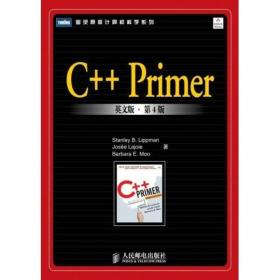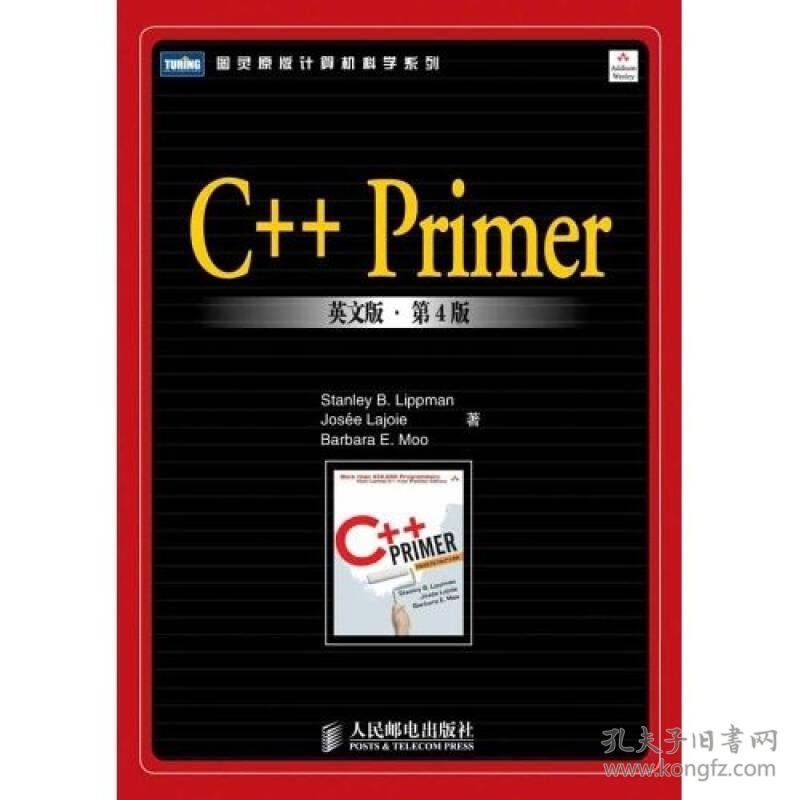
C++Primer(英文版)(第4版)
¥ 18.96 1.9折 ¥ 99 九品
仅1件
北京海淀
认证卖家担保交易快速发货售后保障
作者李普曼 著
出版社人民邮电出版社
出版时间2006-11
版次4
装帧平装
货号A2
上书时间2024-11-14
- 在售商品 暂无
- 平均发货时间 15小时
- 好评率 暂无
- 最新上架
商品详情
- 品相描述:九品
图书标准信息
- 作者 李普曼 著
- 出版社 人民邮电出版社
- 出版时间 2006-11
- 版次 4
- ISBN 9787115151698
- 定价 99.00元
- 装帧 平装
- 开本 16开
- 纸张 胶版纸
- 页数 885页
- 丛书 图灵原版计算机科学系列
- 【内容简介】
-
“在遇到无法解决的问题时,我总会求助于C++Primer一书。”——Bruce·Eckel,“编程思想”系列图书作者
“众所周知,C++Primer是学习C++最理想的参考书之一,适用于各种水平的C++程序员。第4版不但保持了这种传统,而且有了很大改善。”——STEVE?VINOSKI,IONA科技公司首席工程师,CORBA与C++权威。
“《C++Primer(英文版)(第4版)》真正揭示了C++这一大型、复杂语言的本质。”——JUSTIN?SHAW,Aerospace公司电子程序部技术处资深成员
“(本书)不但使初学者迅速入门,而且是用优秀的编程实践引导他们入门。”——NEVIN?LIBER,资深工程师(自1988年起一直是C++开发者)
C++诞生20年后,因其强大的功能、广泛的适用性和极高的效率,已经成为无庸置疑的主流编程语言。但是C++语言也不得不面对这样的挑战:其博大精深不仅令初学者望而生畏,而且即使是许多富于经验的老手也很难全面掌握,更有不少C++程序员一直背负着C语言的历史包袱,常常落入各种微妙难解的安全和性能陷阱。如何使现代C++理念深入人心,使C++更加容易学习和使用,已经成为众所瞩目的焦点。
《C++Primer(英文版)(第4版)》是久负盛名的C++经典教程,已经帮助全球无数程序员学会了C++。这一全新版本进行了彻底的修订,章节内容和编排都经过了重新组织,既显著改善了可读性,又充分体现了C++语言的最新进展和当前的业界最佳实践。《C++Primer》(英文版)(第4版)(图灵原版计算机科学系列)是C++大师Stan?B?Lippman丰富的实践经验和C++标准委员会原负责人Josée·Lajoie对C++标准深入理解的完美结合。新版更加入了C++先驱Barbara?E?Moo在C++教学方面的真知灼见。对C++基本概念和技术全面而且权威的阐述,对现代C++编程风格的强调,使本书不仅依然是初学者的最佳C++指南,而且即使对于中高级程序员,本书也是不可或缺的参考书。 - 【作者简介】
- StanleyB.Lippman,目前是微软公司VisualC++团队的架构师。他从1984年开始在贝尔实验室与C++的设计者BjarneStroustrup一起从事C++的设计与开发。又先后在迪士尼和梦工厂从事动画制作,还担任过JPL的高级顾问。他还著有InsidetheC++ObjectModel。
- 【目录】
-
Chapter1GettingStarted
1.1WritingaSimpleC++Program
1.1.1CompilingandExecutingOurProgram
1.2AFirstLookatInput/Output
1.2.1StandardInputandOutputObjects
1.2.2AProgramthatUsestheIOLibrary
1.3AWordAboutComments
1.4ControlStructures
1.4.1ThewhileStatement
1.4.2TheforStatement
1.4.3TheifStatement
1.4.4ReadinganUnknownNumberofInputs
1.5IntroducingClasses
1.5.1TheSales_itemClass
1.5.2AFirstLookatMemberFunctions
1.6TheC++Program
ChapterSummary
DefinedTerms
PartITheBasics
Chapter2VariablesandBasicTypes
2.1PrimitiveBuilt-inTypes
2.1.1IntegralTypes
2.1.2Floating-PointTypes
2.2LiteralConstants
2.3Variables
2.3.1WhatIsaVariable?
2.3.2TheNameofaVariable
2.3.3DefiningObjects
2.3.4VariableInitializationRules
2.3.5DeclarationsandDefinitions
2.3.6ScopeofaName
2.3.7DefineVariablesWhereTheyAreUsed
2.4constQualifier
2.5References
2.6TypedefNames
2.7Enumerations
2.8ClassTypes
2.9WritingOurOwnHeaderFiles
2.9.1DesigningOurOwnHeaders
2.9.2ABriefIntroductiontothePreprocessor
ChapterSummary
DefinedTerms
Chapter3LibraryTypes
3.1NamespaceusingDeclarations
3.2LibrarystringType
3.2.1DefiningandInitializingstrings
3.2.2ReadingandWritingstrings
3.2.3Operationsonstrings
3.2.4DealingwiththeCharactersofastring
3.3LibraryvectorType
3.3.1DefiningandInitializingvectors.
3.3.2Operationsonvectors
3.4IntroducingIterators
3.4.1IteratorArithmetic
3.5LibrarybitsetType
3.5.1DefiningandInitializingbitsets
3.5.2Operationsonbitsets
ChapterSummary
DefinedTerms
Chapter4ArraysandPointers
4.1Arrays
4.1.1DefiningandInitializingArrays
4.1.2OperationsonArrays
4.2IntroducingPointers
4.2.1WhatIsaPointer?
4.2.2DefiningandInitializingPointers
4.2.3OperationsonPointers
4.2.4UsingPointerstoAccessArrayElements
4.2.5PointersandtheconstQualifier
4.3C-StyleCharacterStrings
4.3.1DynamicallyAllocatingArrays
4.3.2InterfacingtoOlderCode
4.4MultidimensionedArrays
4.4.1PointersandMultidimensionedArrays
ChapterSummary
DefinedTerms
Chapter5Expressions
5.1ArithmeticOperators
5.2RelationalandLogicalOperators
5.3TheBitwiseOperators
5.3.1UsingbitsetObjectsorIntegralValues
5.3.2UsingtheShiftOperatorsforIO
5.4AssignmentOperators
5.4.1AssignmentIsRightAssociative
5.4.2AssignmentHasLowPrecedence
5.4.3CompoundAssignmentOperators
5.5IncrementandDecrementOperators
5.6TheArrowOperator
5.7TheConditionalOperator
5.8ThesizeofOperator
5.9CommaOperator
5.10EvaluatingCompoundExpressions
5.10.1Precedence
5.10.2Associativity
5.10.3OrderofEvaluation
5.11ThenewanddeleteExpressions
5.12TypeConversions
5.12.1WhenImplicitTypeConversionsOccur
5.12.2TheArithmeticConversions
5.12.3OtherImplicitConversions
5.12.4ExplicitConversions
5.12.5WhenCastsMightBeUseful
5.12.6NamedCasts
5.12.7Old-StyleCasts
ChapterSummary
DefinedTerms
Chapter6Statements
6.1SimpleStatements
6.2DeclarationStatements
6.3CompoundStatements(Blocks)
6.4StatementScope
6.5TheifStatement
6.5.1TheifStatementelseBranch
6.6TheswitchStatement
6.6.1Usingaswitch
6.6.2ControlFlowwithinaswitch
6.6.3ThedefaultLabel
6.6.4switchExpressionandCaseLabels
6.6.5VariableDefinitionsinsideaswitch
6.7ThewhileStatement
6.8TheforLoopStatement
6.8.1OmittingPartsoftheforHeader
6.8.2MultipleDefinitionsintheforHeader
6.9ThedowhileStatement
6.10ThebreakStatement
6.11ThecontinueStatement
6.12ThegotoStatement
6.13tryBlocksandExceptionHandling
6.13.1AthrowExpression
6.13.2ThetryBlock
6.13.3StandardExceptions
6.14UsingthePreprocessorforDebugging
ChapterSummary
DefinedTerms
Chapter7Functions
Chapter8TheIOLibrary
PartIIContainersandAlgorithms
Chapter9SequentialContainers
Chapter10AssociativeContainers
Chapter11GenericAlgorithms
PartIIIClassesandDataAbstraction
Chapter12Classes
Chapter13CopyControl
Chapter14OverloadedOperationsandConversions
PartⅣObject-OrientedandGenericProgramming
Chapter15Object-OrientedProgramming
Chapter16TemplatesandGenericProgramming
PartⅤAdvancedTopics
Chapter17ToolsforLargePrograms
Chapter18SpecializedToolsandTechniques
AppendixATheLibrary
Index
点击展开
点击收起
— 没有更多了 —












以下为对购买帮助不大的评价